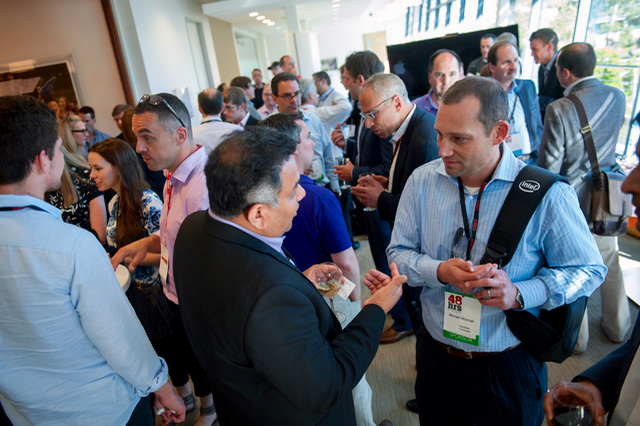PALO ALTO, CALIF.
“Canadians are the greatest people on Earth. But, for the love of God, don’t shoot for eighth place.”
Jonathan Ehrlich, a partner at Foundation Capital, three-time entrepreneur and former head of marketing at Facebook, is speaking to founders of 21 Canadian companies gathered at SAP's campus in Palo Alto, the heart of Silicon Valley. He's delivering a message he has clearly given many times before.
“If you’re not aiming for a market that’s worth $25 billion or more, stop and think again.”
Ehrlich is at the opening reception of the C100’s 48 Hours in the Valley, a program to help Canadian entrepreneurs develop networks in Silicon Valley. And although he believes there are three keys to entrepreneurial success – thinking big, tenacity and focus – it’s most often this first trait that seems to be lacking in Canadian entrepreneurs.
But this is something he believes can be overcome. In his mind, Canadians are well positioned for success, and actually have a good chance of achieving it from Canada.
“You don’t need to be in the Valley. If you get the alchemy right, it can be better not to be here. Because it’s very difficult to hire, and people are mercenary,” says Ehrlich. “Although, if you choose to build a company outside of the Valley, you need to have connections here – investors, networks and an understanding of what you’re up against.”
Which is where the C100, of which Ehrlich is a charter member, comes in.
Mallorie Brodie, co-founder of construction-management software company Bridgit, had heard about 48 Hours in the Valley two years ago, but she felt it was important to have a product in market and some funding secured before applying.
Now, with Bridgit’s product, Closeout, having gained significant traction in the Toronto and Waterloo Region condo markets, along with a successful angel round, she was ready and eager to gain “exposure to what other companies are doing, and what investors expect is important.”
“Founders should have something really interesting and compelling to tell people in the Valley,” says Joanne Fedeyko, Executive Director of the C100. “Something interesting and compelling usually equates to having a good product with strong signs of customer validation, traction worth paying attention to, and being in a market with a huge opportunity. Founders also need to know what they want to receive from people they will meet.”
Auvik Networks, the other Waterloo Region company attending 48 Hours, clearly had the traction, product and experience – its co-founders are serial entrepreneurs with deep roots in the Waterloo tech ecosystem. Less clear was what an experienced company like Auvik had to gain from a program like 48 Hours in the Valley.

Making connections: The C100’s 48 Hours in the Valley program includes social events where
Canadian tech founders can broaden their networks. (Photo: Susana Bates for the C100)
According to co-founder and CEO Marc Morin, it was all about leveraging the C100’s deep connections.
“Auvik does have an experienced team with a network in the Valley,” he said. “But your network can always be expanded. The C100 has a very broad network and we felt that Auvik could benefit from tapping into that network in order to maximize opportunities.”
Over the course of two days in June, Brodie, Morin and founders from 19 other Canadian companies heard from a range of speakers, met with venture capitalists and received mentorship from experts hand-picked from the C100’s broad range of contacts.
Interestingly for co-founders with such different amounts of experience, the presentation of Joyus CEO Sukhinder Singh stood out for both Brodie and Morin as one of the most valuable sessions.
“Maybe [it was] because it resonated so much with my experience as an entrepreneur and ensuring how we get the most out of our teams, without dominating them,” said Morin, who cited “her wisdom of truly understanding your strengths and weaknesses so that you can expand your team to complement them.”
Brodie also pointed to the opportunity to have presentations from, and informal discussions with, Valley VCs as being incredibly useful for companies considering their next funding move.
“The language around fundraising can be very different in Canada [than in] the U.S., so even just having the terminology right and understanding what it is we’re really interested in can make all the difference going into our next round.”
At the end of their 48 hours, Brodie and Morin were enthusiastic about the experience, but saw it as just a step towards developing deeper connections in the Valley. Morin noted, “You can’t think of 48 Hours as a magic bullet; it isn't. It's a step on a journey; maybe that next step involves financing, or partner development. The C100 group is very connected and wants to help. So, take some time to understand why you are going down, and what exactly you are going to ask from the C100 group.”
And it is exactly this journey that Fedeyko believes will help Canadian companies thrive.
“[The C100] wants the Valley DNA to be part of the Canadian startup ecosystem. We don’t believe Canadian companies need to move to the U.S., but we do believe that everyone needs to come to the Valley and take pieces of it home with them. And we want to encourage the spirit of collaboration, competitiveness and kick-ass thinking across the entire Canadian tech landscape.”
After nine cohorts (there are two per year) and more than 200 Canadian companies that have come through the program, Fedeyko believes this mentality is starting to take hold.
“We consistently hear that getting to know other founders is the most valuable aspect of the program – learning about what other founders are up to and going through. All of the founders from this June's 48 Hours now have the responsibility to give back to the Canadian tech ecosystem and support founders along their own journey, and that is how the C100 will continue to be successful.”

